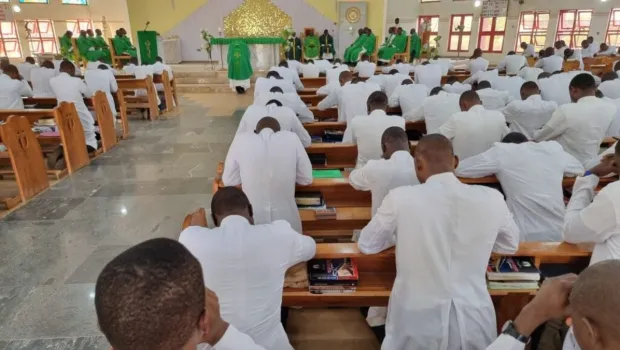According to a new report from the U.S. Commission on International Religious Freedom, Nigeria has once again failed one of the most basic tests of democracy: the right to believe freely and without fear. Despite years of official assurances, the report says, the country’s commitment to religious liberty is eroding, not strengthening.
Released on July 21, the Commission’s Country Update on Nigeria paints a grim portrait of what daily life now looks like for people of faith. It details waves of violence against religious communities, the persistence of blasphemy laws, and the government’s striking unwillingness or perhaps inability to intervene. What emerges is not just a failure of governance, but a crisis of moral authority.
“It is egregious that the Nigerian government continues to tolerate the relentless violence committed by bandit gangs against religious communities,” said Commissioner Stephen Schneck in an interview with Aleteia. His frustration is palpable, the kind that comes from watching the same cycle of horror and inaction play out year after year. “These persistent attacks must be urgently addressed,” he added, urging that the U.S. once again label Nigeria a Country of Particular Concern, or CPC a designation the Commission has been recommending since 2009.
That recommendation, by now, feels almost ritualistic: a recurring lament in the Commission’s annual and country-specific reports. The USCIRF was created by the 1998 International Religious Freedom Act, a piece of legislation meant to make the protection of belief a pillar of U.S. foreign policy. But its reports on Nigeria have begun to sound like dispatches from a moral stalemate each more urgent, each met with little visible change.
In its latest findings, the Commission notes that twelve Nigerian states and the federal government itself continue to enforce so-called blasphemy laws, prosecuting and imprisoning citizens accused of “insulting religion.” Four individuals are currently behind bars on such charges, among them two Islamic clerics. That detail is telling: persecution here isn’t limited to one faith or faction. It is systemic.
To criminalize offense against the divine, the report implies, is to hand the divine over to human rage. Once blasphemy becomes a matter for courts or mobs the result is not reverence but fear. You can feel the chill that such laws cast over spiritual life: the silence of imams, priests, or laypeople who have learned that to speak honestly is to risk their freedom.
Recommended: Franklin Graham quits membership in financial accountability group
Beyond the courtroom, the violence is unrelenting. The Commission writes that the Nigerian government has done little to contain the terror inflicted by armed gangs, whose attacks “severely restrict religious practice and observance” among Christians, Muslims, and traditional believers across much of the Middle Belt and the northeast.
Churches and mosques are burned, religious leaders kidnapped or killed. In some regions, these groups impose so-called “taxes” on local communities, invoking Shari’a law as justification for extortion and bloodshed. The language of faith becomes the mask of lawlessness.
And this year, the violence has reached sacred ranks. In 2025 alone, numerous priests, seminarians, and members of religious orders were abducted or murdered. Each incident may seem isolated on paper, but together they sketch the outline of a state that has ceded its moral center to chaos.
Nigeria, a nation split almost evenly between Muslims and Christians with a smaller but deeply rooted population practicing traditional religions has long been held up as a model of coexistence. Yet that balance now feels increasingly precarious.
What happens when belief becomes a liability? When a priest fears the road to Mass, or an imam measures his words against the threat of reprisal? You might wonder whether the freedom to worship can survive once fear becomes the country’s common faith.
The Commission’s report does not offer easy hope. It is, at heart, a document of witness: a reminder that religious liberty can die not only through oppression, but through neglect. Nigeria’s story, as told here, is less about overt persecution than about something subtler and more insidious the slow, public abandonment of those who refuse to give up their faith.
And that, perhaps, is the most grievous betrayal of all.
